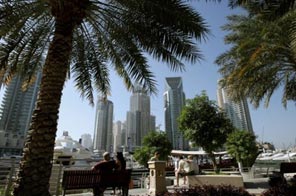Dubai to pay debt with $10 b aid from Abu Dhabi
DUBAI: The Dubai government said it will pay 4.1 billion dollars to cover Islamic bonds issued by its Nakheel property developer which mature Monday after receiving 10 billion dollars from oil-rich Abu Dhabi.
The Dubai stock market surged over 10 percent as it awoke to Dubai's fresh announcement, while the market in neighbouring Abu Dhabi opened up 7.07 percent.
"The government of Abu Dhabi has agreed to fund 10 billion dollars to the Dubai Financial Support Fund that will be used to satisfy a series of upcoming obligations on Dubai World," an official statement said.
"As a first action for the new fund, the government of Dubai has authorised 4.1 billion dollars to be used to pay the sukuk (Nakheel Islamic bonds) obligations that are due today," it added.
The announcement comes on the day Nakheel was supposed to repay sukuks worth 3.5 billion dollars and the return on them amid speculations that the troubled developer would not be bailed out.
The news saw the Dubai Financial Market index gaining 171 points at opening to 1,866.80, with all sectors in the green and property giant Emaar surging by a full 15 percent, the maximum allowed in a session.
Dubai has worked closely with the central bank of the United Arab Emirates (UAE) and the government of Abu Dhabi to find a solution to the debt problems.
"Dubai World announced that it might not be able to commercially support its obligations," said the statement issued by Sheikh Ahmed bin Saeed al-Maktoum, the head of Dubai Supreme Fiscal Committee.
This included "addressing and assessing the impact of Dubai World on the UAE economy, banking system and investor confidence," it said.
Rating agencies had downgraded several Dubai corporates after Dubai said on November 25 that it wanted to freeze debt repayments by its heavily-indebted Dubai World group -- liable for 59 billion dollars -- in order to restructure the largest state-run company.
The government said Monday that the remainder of the 10 billion dollars will "provide interest expenses and company working capital through April 30, 2010."
But it said that the latter will be "conditioned on the company being successful in negotiating a standstill as previously announced," which means that the company will still have to go back to creditors to restructure its remaining debt.
"The remainder of the funds provided will be used for the satisfaction of obligations to existing trade creditors and contractors. Discussions with affected contractors will begin in short order," it added.
Dubai World had said earlier that not all its subsidiaries would be involved in the restructuring, pointing out that the debt of the concerned units amount to 26 billion dollars.
The statement said also that the government will later Monday issue a "comprehensive reorganisation law, a framework that is based upon internationally accepted standards for transparency and creditor protection."
This step seems aimed at appeasing creditors who have been scared off by Dubai's earlier announcement that it might not be able to pay Dubai World debt and its insistance that the government would not guarantee state-corporates debt.
The once rapidly-booming economy of Dubai has been hit hard by the global financial crisis, which turned off the tap on easily-available foreign finance, leaving many of its companies high and dry with a heavy debt burden.
The total debt of Dubai government and its state-run companies is a minimum of 80 billion dollars, and estimated to run into 100 billion dollars.
A new bail out from the deep-pocketed Abu Dhabi appeared distant until recently, but the leading United Arab Emirates partner appears unwilling to let Dubai sink.
Two Abu Dhabi-controlled banks had subscribed last month to a five-billion-dollar bonds package issued by the government of Dubai.
The UAE central bank had also fully-subscribed to a 10-billion-dollar bond issuing in February, earmarked to help Dubai sort its debt problem.






